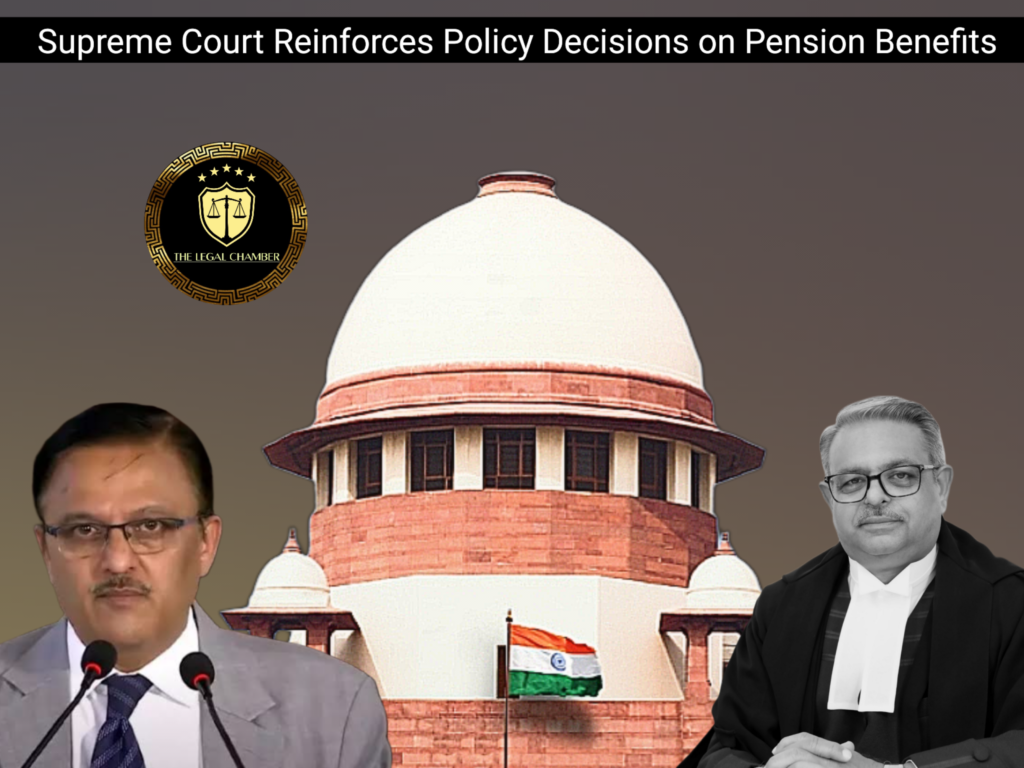
The Supreme Court of India upheld the Reserve Bank of India’s (RBI) decision to fix a cut-off date (July 1, 2020) for pensionary benefits for employees switching from the Contributory Provident Fund (CPF) scheme, rejecting the claim for retrospective arrears from the date of retirement. The Court emphasized that financial implications and administrative exigencies are valid considerations for policy decisions and that employees cannot selectively accept beneficial terms while rejecting unfavorable ones.
Facts Of The Case:
M.T. Mani, Respondent No. 1, joined the Reserve Bank of India (RBI) in 1981 and was a member of the Contributory Provident Fund (CPF) Scheme. He retired as a Manager on November 30, 2014, having received four prior opportunities between 1990 and 2000 to switch to the Pension Scheme, but chose to remain with the CPF. Upon retirement, he was paid his full CPF dues and gratuity.In February 2020, Mani filed a Writ Petition in the Kerala High Court seeking a direction to the RBI to allow him to opt for the Pension Scheme and grant him pension benefits from his retirement date, November 30, 2014, with 12% interest on arrears. During the pendency of this petition, the RBI, with the Government of India’s approval, issued Administration Circular No. 1 on September 14, 2020. This circular offered a “last option” for eligible CPF optees, including retired employees, to switch to the Pension Regulations, subject to refunding the RBI’s CPF contribution with accrued interest and 3% simple interest. Crucially, the circular clarified that pension would be payable from July 1, 2020, and no arrears would be paid for the period prior to this date.Mani opted for the Pension Scheme as per the 2020 circular and is now receiving a monthly pension. However, he amended his Writ Petition to challenge the denial of pension arrears from his retirement date, seeking 12% interest on these arrears. A Single Judge of the High Court dismissed his petition, stating he had accepted the terms and could not challenge a part of the scheme. A Division Bench, however, allowed his appeal, ruling that the denial of arrears was discriminatory, and directed the RBI to pay pension benefits from his retirement date with 6% interest if delayed. The RBI then appealed this decision to the Supreme Court.
Procedural History:
The Respondent, M.T. Mani, initiated a Writ Petition before the Kerala High Court on February 14, 2020, challenging the rejection of an RBI proposal for another pension option. While the petition was pending, the RBI issued Administration Circular No. 1 on September 14, 2020, offering a final pension option with prospective effect from July 1, 2020, explicitly stating no arrears would be paid for the prior period. The Respondent opted for this scheme, amended his Writ Petition to challenge the denial of retrospective pension benefits and seek 12% interest on arrears from his retirement date of November 30, 2014. A Single Judge dismissed the amended Writ Petition on April 4, 2023, reasoning that the Respondent, having accepted the scheme’s terms, could not challenge a part of it. The Division Bench, however, allowed the Respondent’s appeal on December 18, 2023, finding the denial of arrears discriminatory and arbitrary, and directed the RBI to pay pension benefits from his retirement date with 6% interest if delayed. The RBI subsequently appealed this decision to the Supreme Court
READ ALSO : Section 26 NGT Act Strictly Applied: Supreme Court Clarifies Penal Liability in Environmental Violations
Court Observation:
The Supreme Court observed that the Respondent had four previous opportunities (1990, 1992, 1995, and 2000) to switch to the Pension Scheme but consistently chose to remain with the CPF Scheme. Each administrative circular offering these options was independent, with varied terms and conditions, including different interest rates for refunds. The Court noted a 20-year gap since the last option in 2000, during which the Government had three times declined proposals for another switch. The 2020 scheme, explicitly stating pension would be payable from July 1, 2020, with no arrears, was based on financial calculations presented to the Government. The Court found the financial burden of over ₹900 crores for retrospective liability to be unsustainable for the RBI. Therefore, the fixed cut-off date was deemed a valid policy decision, falling within the executive’s domain, and not arbitrary or discriminatory. An employee cannot selectively accept beneficial terms while rejecting unfavorable ones from a comprehensive scheme.
Final Decision & Judgement:
The Supreme Court, in its final decision, allowed the appeal filed by the Reserve Bank of India (RBI). It held that the Division Bench of the High Court of Kerala’s judgment dated December 18, 2023, could not be sustained and was, therefore, set aside. Consequently, the judgment of the Learned Single Judge dated April 4, 2023, which dismissed the writ petition preferred by the Respondent, was restored. The Court concluded that there was no violation of Constitutional, Statutory, or Common Law principles by the RBI’s scheme. As a result, there were no orders as to cost, and any pending application(s) were also disposed of
Case Details:
Case Title: The Reserve Bank of India vs. M.T. Mani and Another Citation: 2025 INSC 769 Civil Appeal No.: 13962 of 2024 Date of Judgment: May 23, 2025 Judges/Justice Name: Augustine George Masih, and Abhay S. Oka,
Download The Judgement Here